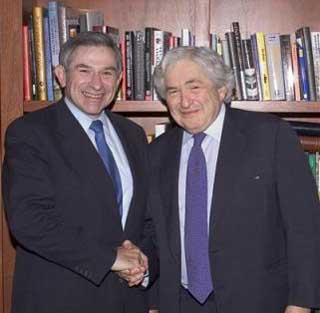|
World Bank board approves Wolfowitz
(Agencies)
Updated: 2005-04-01 08:46
WASHINGTON - The World Bank's board on Thursday unanimously approved the nomination of Deputy Defense Secretary Paul Wolfowitz, an architect of the Iraq war, to be the next president of the 184-nation development bank.
US President Bush earlier this month surprised the international community by recommending Wolfowitz for the job. Wolfowitz's hard-line foreign policy stance has made him a target of critics at home and abroad. Wolfowitz, 61, will take the helm of the development bank on June 1 to serve a five-year term..

Photo provided by the World bank shows current World Bank President James D. Wolfensohn, right, greeting World Bank President-designate Paul Wolfowitz prior to a meeting at World Bank in Washington, Thursday, March 31, 2005. [AP] |
The bank's stated mission is to fight poverty and improve the living standards of people in developing countries. It lends around $20 billion a year to developing countries for various projects, including roads, schools and fighting AIDS.
"I want to thank the board for their vote of confidence," Wolfowitz said in a statement after the decision. "It is humbling to be entrusted with the leadership of this critically important international institution."
The United States is the bank's largest shareholder. The bank traditionally has had an American president. The unanimous approval came from the bank's 24-member board.
Since his March 16 nomination by Bush, Wolfowitz, seeking to quell criticism over his selection, has reached out. He has telephoned Bono, the Irish rock star who is a vocal advocate for helping the world's poor. He has met with many countries' representatives to the World Bank and made a trip to Europe, where he won the endorsement of European Union governments. Support from Europe was important because hostility there still lingers over the U.S.-led war in Iraq.
Bush's choice of Wolfowitz has especially raised the hackles of some international aid organizations and other groups. They question his development credentials and worry that he would try to use the development bank to help the United States' friends and punish its enemies. Some of those critics showed up on a gray morning to protest the choice of Wolfowitz outside the World Bank's headquarters Thursday.
Wolfowitz has sought to counter those concerns. He has said that poverty reduction and economic development were the bank's core businesses and that he would not pursue any political agenda.
"I really believe the mission of the bank," Wolfowitz had told The Associated Press in a March 16 interview. "I think one of the challenges of the institution, and therefore, for me, is how to make sure it makes the best use of the considerable resources at its disposal, which are both financial and human."
While critics question his development credentials, Wolfowitz has said his management experience at the Pentagon and his diplomatic experience at the State Department prepared him for the job. At State, he was assistant secretary for East Asia and U.S. ambassador to Indonesia.
Wolfowitz also has been criticized on Capitol Hill for underestimating the number of U.S. troops needed in Iraq and for understating, during testimony to a House panel, the number of troops killed in Iraq. He also was criticized for predicting before the invasion that Iraqi oil would generate $50 billion to $100 billion over two to three years, limiting U.S. war costs. Instead, Iraq generated just $17 billion in oil revenues in the first 19 months after the invasion.
The installation of Wolfowitz allows the Bush administration to puts its imprint on the development bank, which employs some 10,000 people worldwide.
James Wolfensohn, the current president, will step down at the end of May, when his second, five-year term concludes.
Wolfensohn helped engineer a number of changes in the bank's philosophy and the way it operates. He pushed to put greater emphasis on "home grown" development planning, trying to connect the bank closer to the countries it seeks to help. He pushed for debt relief for the world's poorest countries. His 1996 "cancer of corruption" speech focused a new light on corruption as an impediment to development that must be addressed.
"I will make every effort to ensure that our transition period is successful, so Paul can hit the ground running on June 1," Wolfensohn said.
|